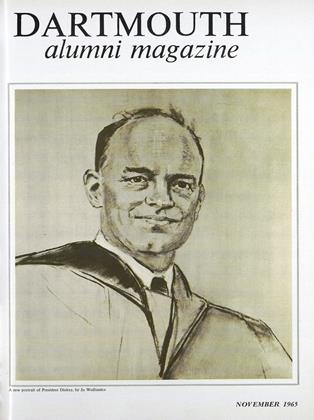IN the two decades of the Dickey administration the College's academic program has reflected, and in some cases anticipated, the demands upon higher education in this postwar, post-Sputnik period of intense concerns in science, in culture past and present, in human relations, and in domestic and international policies.
One of the first major innovations expressed "the concern of a man who had been personally involved in some of the major public decisions of the early forties. The introduction of Great Issues in 1947 brought before the seniors a rich variety of persons intimately acquainted with contemporary problems of man. The Great Issues Course has been studied and subtly changed over the years, and now a major re-evaluation, with student participation invited, will be undertaken to measure GI's effectiveness in confronting today's seniors with today's issues.
In 1961 the responsibility for GI was given to the newly established Public Affairs Center. The Center has since inaugurated a series of searching studies of public policies, has provided leadership for student activities related to public service, and has nurtured an expanded program of internships which now annually sends some fifteen to twenty young men into work-study situations in Washington and in various state capitals.
The study of the Russian civilization and language was inaugurated in the early fifties, and in recent years a similar program in Chinese has been added. Foreign study, programs whereby undergraduates interested in French, German, Spanish, or Russian studies can spend a term at a European university at little or no extra cost were also initiated to enrich this portion of the curriculum.
Through faculty seminars and sponsored research projects the Comparative Studies Center, now in its third year, played an important role in the development of a new approach for the reorganized Comparative Literature studies - and for many of the eighteen new courses now being offered in this program. The Center promises to enlarge the non-Western content of the curriculum and to enhance undergraduate offerings even more in the future.
Structurally, of course, the greatest curriculum change of the Dickey administration to date was the introduction of the three-course, three-term schedule. Now taken as a matter of course by undergraduates and faculty alike, "three-three" not only established new patterns for the year, the week, and the day but reaffirmed in a sharp way Dartmouth's concern for independent learning. It also provided a framework for a Summer Term that has embraced a rich assortment of educational ventures.
In addition the introduction of "three-three" also necessitated a re-evaluation of course content by faculty members in all departments. New approaches as well as new time schedules resulted, and in turn other areas of the undergraduate educational program were examined closely. A program in general reading was tried, then after several years dropped, but from it came new insights, some of which were important to the faculty decisions to alter the distributive requirements for the first two years of study and to introduce new departmental "freshman seminars" in various disciplines. A re-examination of the junior and senior years of the curriculum is now under way.
As a short piece in last month's issue of the ALUMNI MAGAZINE indicated, new facilities, new members of the faculty, and close attention to undergraduate needs and talents have all contributed to a challenging offering of new courses keyed to the demands of modern scholar- ship. One such offering is a dramatic ap- proach to engineering education which evolved from a hard look at the prob- lems engineers must meet in the future as well as the demands faced today - and at what was being offered the engineering student - which resulted in an engineer- ing science major that begins with a novel course in design and practical applica- tion of engineering concepts for sopho- mores and continues in the same vein. New men and new techniques in Thayer School have made such advanced think- ing work, and similar dynamic programs of teaching in mathematics and bio- logical sciences, to cite only two of many areas, have also achieved advances which have served as models for others.
The educational program of the Dickey administration's first twenty years has been fluid, using to good advantage the many new teaching facilities such as the integration of the new biological sciences laboratory into the Gilman Biomedical complex and the campus-wide inputoutput service of the computer facility, incorporating new educational concepts from elsewhere as well as creating new approaches on campus, recruiting fresh faculty talent at all levels and encouraging enterprising creative men on campus, and responding in meaningful ways to the energies and demonstrated talents of the young men who chose and are chosen for the Dartmouth experience.
 View Full Issue
View Full Issue
More From This Issue
-
 Feature
FeatureGraduate Study—Past and Present
November 1965 By PROF. LEONARD M. RIESER '44, -
 Feature
FeatureThe Conscience of Liberal Learning
November 1965 -
 Feature
FeatureAn Exciting 20-Year Forward March
November 1965 -
 Feature
FeatureDartmouth's First Lady
November 1965 By MARGARET BECK McCALLUM -
 Feature
FeatureCHAIRMAN'S REPORT 1964-1965 CAMPAIGN
November 1965 By Rupert C. Thompson, Jr. '28 -
 Feature
FeatureFishing the Grant with John Dickey
November 1965 By EDWARD WEEKS, LITT.D. '50,
Article
-
 Article
ArticleTUCK SCHOOL AWARDS DEGREES TO THIRTY-TWO MEN
June 1925 -
 Article
ArticleSecretaries Take Notice
MARCH 1930 -
 Article
ArticleA TIME FOR PRAISE
November 1932 -
 Article
ArticleSecretaries Meetings
June 1937 -
 Article
ArticleTHE UNDERGRADUATE CHAIR
FEBRUARY 1965 By BOB WILDAU '65 -
 Article
ArticleScience Posters Make Me Sweat
September 1995 By Heather Killebrew '89

